Samsung Galaxy Note 9 alerts users to bad photos
Samsung's new high-end smartphone alerts owners to problems with their photos as soon as they are snapped.
The Galaxy Note 9 uses software to identify if the images are blurry or whether the subject is blinking, among other issues.
The innovation is one of several artificial intelligence-enhanced abilities the handset offers that do not rely on remote computer servers.
Analysts say this should help tackle increasing competition from Huawei.
The Chinese rival made much of its own flagship phone's machine learning abilities when it launched in March.
The Note 9's other new features include a stylus that wirelessly communicates with the phone to act as a remote control. Its display and battery are also bigger than earlier models.
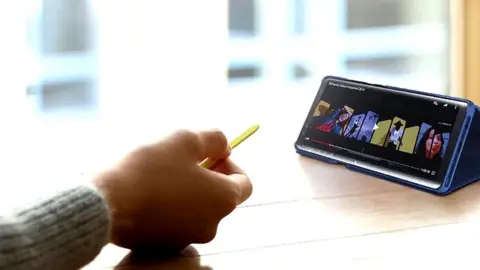 Samsung
SamsungIt goes on sale on 24 August.
The basic model will cost £899, while a version with more storage and memory will be £1,099.
The New York launch comes just over a week after Samsung revealed that sales of its other high-end smartphone - the Galaxy S9 - had disappointed.
It acknowledged at the time that the Note 9's release had been brought forward as a consequence.
"Samsung will be mindful to criticism that the S9 offered iterative improvements to the S8," commented Shaun Collins, chief executive of the CCS Insight consultancy.
"For existing Note users - who are fiercely loyal to the devices - the upgrades will be seen as compelling.
"But the jury is still out on whether people considering an alternative product, such as the iPhone or P20 Pro, will feel this is different enough to bring them across."
Samsung also revealed that a tie-up with games developer Epic meant that existing Galaxy phones are the first Android devices to get access to the hit game Fortnite.
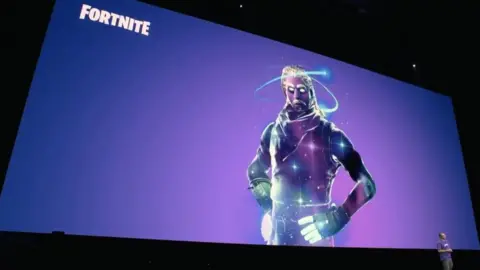 Samsung
SamsungThey can download a beta version of the game now ahead of it rolling out to other devices later this week.
A Galaxy Home smart speaker powered by the firm's virtual assistant Bixby was also unveiled, in addition to a 4G-enabled smartwatch powered by the firm's Tizen operating system.
Samsung has shipped nearly 143 million Galaxy Note handsets since the product line launched in 2011, according to market research firm IDC.
That represents about 7% of all the smartphones it has delivered over the period, but their premium prices mean they have accounted for 10% of revenues.

Samsung's lead gets squeezed
Source: IDC
* Based on preliminary data for April-to-June 2018

Photo review
The Note 9 makes use of a rear dual aperture camera - which adjusts how much light gets in - in a similar manner to the S9. But its software is now smarter.
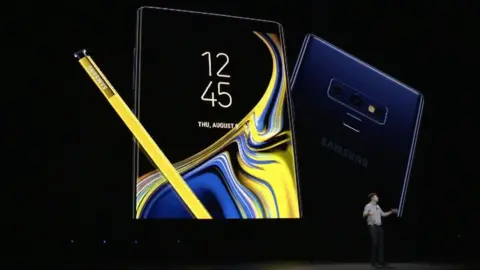 Samsung
SamsungThe Flaw Detection facility warns when:
- images appear out of focus
- it detects a smudge on the lens
- the lighting is bad
- the subject has their eyes shut
In addition, Scene Optimiser algorithms attempt to identify the contents of the scene. If they succeed, one of 20 sets of adjustments are made to tweak the contrast, colour and other settings.
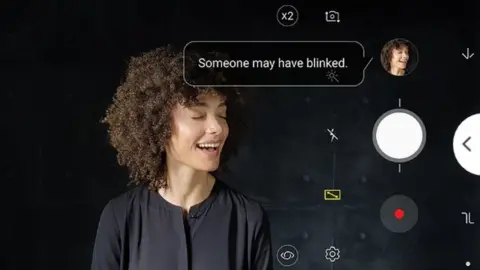 Samsung
SamsungNone of this requires an internet connection.
"It was really important that Samsung did this on the device because it makes it faster and more secure," commented Francisco Jeronimo from IDC.
"But I was expecting to see even greater use of AI, and to me this seems like Samsung is catching up with Huawei rather than going beyond."
Samsung did, however, demo new capabilities for its smart assistant Bixby.
These included the ability to handle follow-up questions during a conversation, and integration with Google Maps.
The new S Pen is the first to include Bluetooth connectivity.
This means that in addition to being a stylus, it acts as a remote control.
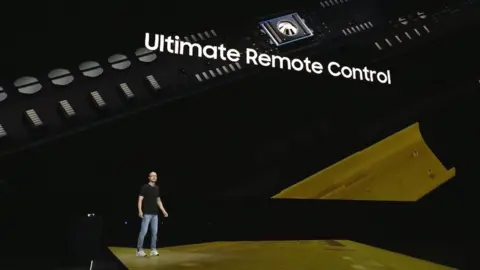 Samsung
SamsungIt can be used to trigger selfies, play and pause YouTube clips, and move along PowerPoint slides.
In addition, Samsung is making it possible for other app developers to make use of the functionality.
Mr Jeronimo was more positive about the impact this would have.
"The targeted corporate and professional users will appreciate being able to control presentations remotely," he explained.
"Many will now be able to do without a laptop."
 Samsung
SamsungAlthough the device looks similar to its predecessor, the Note 9 is slightly wider and thicker.
This allows it to have a slightly bigger 6.4in (16.3cm) display and a 4,000mAh battery - representing 21% more capacity than the Note 8.
A more expensive variant is also offered this time round, with 8 gigabytes rather than 6GB of RAM (random-access memory) and 512GB instead of 128GB of internal storage.
The firm added that its proprietary CPU (central processing unit) was 33% faster than before.
This is likely to appeal to hardcore gamers and other power users if they can justify the cost.
Smart speaker
Samsung also provided a brief first look at the forthcoming Galaxy Home smart speaker.
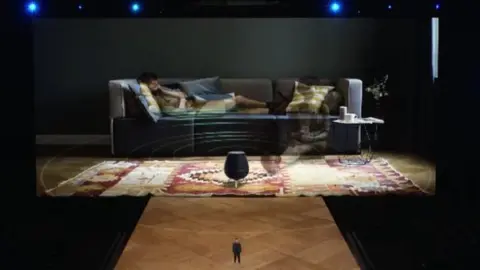 Samsung
SamsungIt said the voice-controlled device would direct audio at owners via a technology it called SoundSteer, and added that the device included eight microphones to detect voices - more than Amazon's Echo, Google's Home Max or Apple's HomePod.
Samsung said that it had partnered with Spotify to provide a streamed music service but did not reveal if other options would be available.
Allow X content?
The new Galaxy Watch ditches the previous Gear S branding.
It also confounded predictions that the firm would swap Tizen for Google's Android Wear operating system.
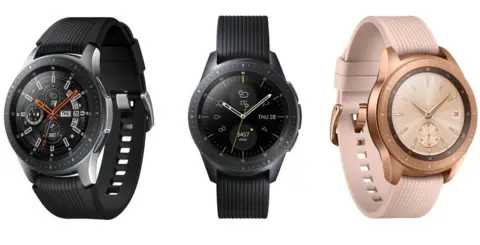 Samsung
SamsungThe device promises up to seven days of battery life - up from the four days promised by the Gear S3.
It also features stress-tracking software and the ability to connect to mobile networks independently.
Allow X content?
But the South Korean firm lags far behind in this market.
While Apple is ranked the bestselling wearable tech manufacturer, according to IDC's latest figures, Samsung did not even make the top five.
